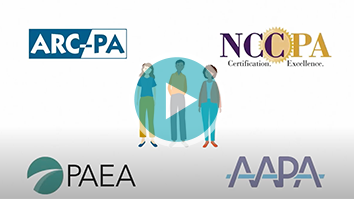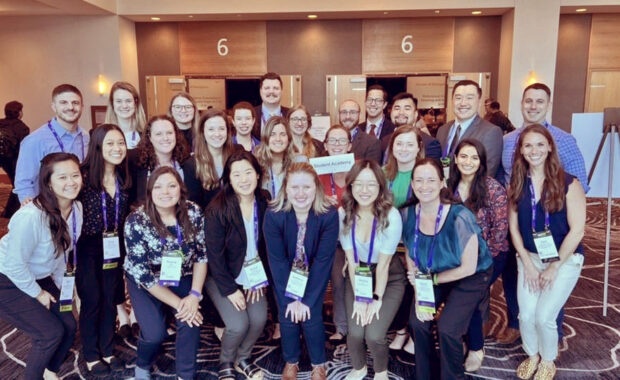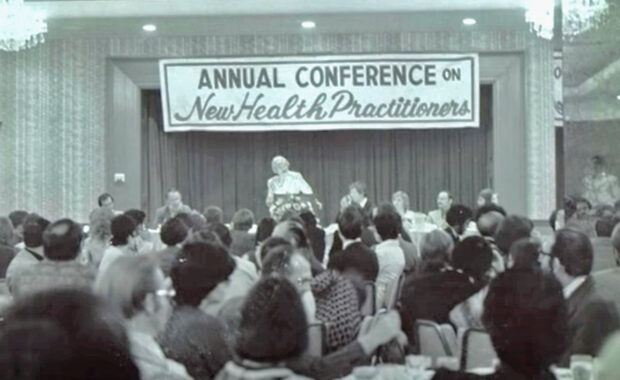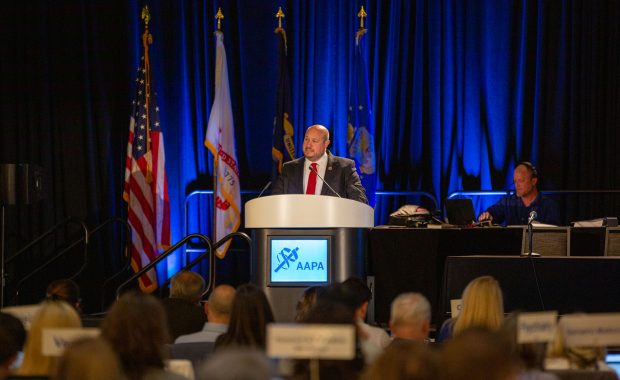About AAPA
Founded in 1968, the American Academy of Physician Associates (AAPA) is the national professional society for PAs (physician associates/physician assistants). It represents a profession of more than 178,700 PAs across all medical and surgical specialties in all 50 states, the District of Columbia, U.S. territories, and the uniformed services.
AAPA advocates and educates on behalf of the profession and the patients PAs serve. We work to ensure the professional growth, personal excellence and recognition of PAs. We also enhance their ability to improve the quality, accessibility and cost-effectiveness of patient-centered healthcare.
Follow along as AAPA implements the physician associate title change
Our Vision
PAs transforming health through patient-centered, team-based medical practice.
Our Mission
AAPA leads the profession and empowers our members to advance their careers and enhance patient health.
Our Values
- Leadership and Service: We inspire a shared vision to lead the profession, emphasize service to our members and enhance the ability of PAs to serve patients and their communities.
- Unity and Teamwork: We embrace the strength of our members and constituent and partner organizations to speak with one voice for the profession and work together to transform health.
- Accountability and Transparency: We listen, deliver results, take ownership for our actions and operate in an environment of openness and trust.
- Excellence and Equity: We commit to the highest standards and seek to eliminate disparities and barriers to quality healthcare.
Diversity, Equity, and Inclusion
AAPA is committed to advancing diversity, equity, and inclusion (DEI) at our organization and within the PA profession. AAPA is working to enhance the diversity of the PA profession, address health inequities among patients, and foster a staff culture that is committed to DEI.
AAPA Member Overview
- Total Membership: 74,000+
- Student Membership: 20,000+
- Fellow Membership: 46,000+
- 3 AAPA Fellow Membership Options. Learn more.
Constituent Organizations
Independent organizations affiliated with AAPA, Constituent Organizations (COs) provide PA members local continuing medical education (CME) programs, networking opportunities, and advocacy and job resources. AAPA COs include:
- State & Federal Service Chapters – Chartered chapters of AAPA in every state, one U.S. Territory, and the District of Columbia. There are also five federal service chapters.
- Specialty Organizations – Specialty organizations support AAPA’s knowledge base regarding medical specialty practice issues. Twenty-seven organizations strengthen the PA profession through their specialized medical knowledge and interactions with their medical and professional counterparts. These relationships allow specialty organizations to partner with AAPA to address challenges with reimbursement, clinical practice, regulation and other matters.
- Special Interest Groups – SIGs are informal groups of individuals sharing a common goal or interest. SIGs are recognized and approved by AAPA’s Board of Directors. AAPA currently recognizes 27 SIGs including PAs in Obesity Medicine, PAs in Pain Medicine, and more.
- Caucuses – A caucus is composed of individuals who share a common goal or interest related to healthcare access or delivery. AAPA currently recognizes 11 caucuses including PAs for Global Health, PAs for Latino Health, and more.
Member Services
- Advocacy and Government Relations – AAPA’s advocacy staff works with policymakers and third-party payers at both the national and state levels to advance PA practice so that PAs can deliver quality healthcare to patients.
- Reimbursement – AAPA reimbursement staff works on behalf of PAs to ensure that insurance companies and Medicare and Medicaid cover PA-provided medical and surgical services.
- Professional Practice – The professional practice staff works with PAs on issues such as credentialing, privileging, Joint Commission, and liability insurance to secure professional standing and enable PAs to focus on patient care.
- Education – AAPA offers an array of CME opportunities, from in-person and virtual CME conferences to CME on Demand digital libraries and online modules. In Learning Central, PAs can earn more than 500 credits of AAPA Category 1 CME and customize their own curriculum.
- Public Awareness – AAPA actively promotes the value of PAs through content development, and integrated marketing and communications campaigns.
- Research – In partnership with PA-focused organizations, AAPA continuously collects and analyzes data on the profession, publishing findings in reports and peer-reviewed journals. These include the AAPA Salary Report, state-bystate profiles of PA practice, and scholarly articles.
- Publications – AAPA delivers relevant clinical news and other information for and about PAs through our print and online publication, the Journal of the American Academy of PAs (JAAPA).
- Career – AAPA’s Career Central is home to a robust library of resources that are designed to support PAs and future PAs as they navigate every step of their career journey. Resource topics include applying to PA school, selecting a specialty, and contract negotiation, among others.
Special Events
- AAPA Conference – PAs connect with thousands of their colleagues and PA students at the profession’s preeminent educational and networking event.
- National PA Week – Celebrated every year from Oct. 6-12, National PA Week is an opportunity to recognize the PA profession and its contributions to improving the nation’s health.
- AAPA Leadership and Advocacy Summit – The PA profession’s premier event for leadership development and advocacy training with an opportunity to participate in federal advocacy and earn CME.
- Executive Leadership Conference – This annual conference offers PA leaders professional networking opportunities and a first-rate leadership and management curriculum.
- Adult Hospital Medicine Boot Camp – Sponsored by AAPA and the Society of Hospital Medicine, this course is designed to provide PAs and NPs with a broad foundation on commonly encountered diagnoses in hospitalized adult patients. At Boot Camp, participants dive into the most current, evidence-based topics in hospital medicine. It’s an ideal course for those new to hospital medicine or those who practice in another specialty and are responsible for the medical management of hospitalized adult patients.
- Musculoskeletal Galaxy – Sponsored by AAPA and the American Association of Orthopaedic Surgeons, this course is designed to offer PAs and NPs a well-rounded foundation on the essential orthopaedic topics. Faculty discuss topics across orthopaedic specialties, including the most common conditions of the spine, shoulder, elbow, wrist, hand, hip, knee, ankle, and foot. It’s the perfect course for those new to orthopaedics, or for family medicine, emergency medicine, or urgent care providers who see musculoskeletal conditions in daily practice.
- We Are Family (Medicine) – This course is designed to provide PAs and NPs with essential updates and skills necessary for family medicine practice. It’s appropriate for all experience levels practicing in family medicine and general internal medicine. Faculty discuss important updates pertaining to family medicine care, including guidelines changes and emerging treatments. Hands-on skills workshops provide the opportunities in areas that PAs/NPs often don’t receive in-depth training on in school, such as EKG reading, IUD insertion, and diabetes technologies. The content focuses on adult medicine while also touching on some critical pediatric and adolescent topics. Both acute and preventive care topics are covered.
Leadership & Governance
The Board of Directors is AAPA’s governing body, responsible for AAPA’s strategic, administrative, and financial management. The House of Delegates is AAPA’s policy-making body. The Student Academy and the PA Foundation have their own boards and committees.
AAPA conducts annual elections in which fellow members choose their next president, along with any other open board positions. AAPA’s volunteer engagement creates a wide variety of task oriented, outcome–focused opportunities, where members lend their expertise and time to address a wide range of issues affecting PAs, the patients they serve, and healthcare.
Download our About AAPA Fact Sheet (PDF) for more stats and information.
The 4 National PA Organizations
While they have different roles, each of the 4 key national organizations related to PAs – ARC-PA, PAEA, NCCPA, and AAPA – are united in providing resources to support PAs throughout their careers.
Watch this video to learn more about their unique offerings and how they work together to support the profession.
AAPA’s 2021-2025 Strategic Plan
AAPA developed a strategic plan that will guide AAPA’s work through 2025. Built upon the foundation of three strategic pillars, this vital and well-researched roadmap will lead AAPA and the PA profession into the future of healthcare.
We’ve provided two resources to help you learn more about AAPA’s goals and objectives:
- For AAPA members, a comprehensive review of the 2021-2025 Strategic Plan, presented by Chief Strategy Officer Daniel Pace.
- A one-page PDF available to all PAs and the public.
Please email [email protected] with questions, comments, or feedback.




